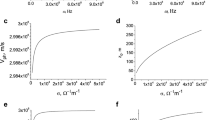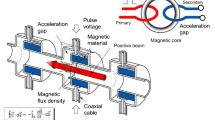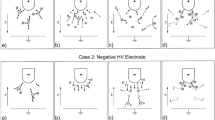Abstract
STUDIES1,2 of sparks in short gaps have shown that under suitable conditions breakdown can occur within times, after the application of the gap voltage, which are considerably smaller than those expected if the initial ionization in the gap were due only to natural processes such as natural radioactivity, cosmic rays, or the break-up of gaseous ions. It is clear, therefore, that there must be another source of initiatory electrons. There is, however, considerable doubt concerning the nature of these sources, and the mechanism of electron liberation from them.
This is a preview of subscription content, access via your institution
Access options
Subscribe to this journal
Receive 51 print issues and online access
$199.00 per year
only $3.90 per issue
Buy this article
- Purchase on Springer Link
- Instant access to full article PDF
Prices may be subject to local taxes which are calculated during checkout
Similar content being viewed by others
References
Llewellyn Jones, Proc. Phys. Soc., 62 B, 366 (1949).
Cobine and Easton, J. App. Phys., 14, 321 (1943).
Stern, Gossling and Fowler, Proc. Roy. Soc., A, 124, 699 (1929).
Schottky, Z. Phys., 14, 63 (1929).
Author information
Authors and Affiliations
Rights and permissions
About this article
Cite this article
LLEWELLYN JONES, F., DE LA PERRELLE, E. Cold Emission of Electrons in Spark Gaps. Nature 168, 160–161 (1951). https://doi.org/10.1038/168160b0
Issue Date:
DOI: https://doi.org/10.1038/168160b0
This article is cited by
-
Decay of Light to Very Low Levels from Spark Discharges
Nature (1952)
Comments
By submitting a comment you agree to abide by our Terms and Community Guidelines. If you find something abusive or that does not comply with our terms or guidelines please flag it as inappropriate.



